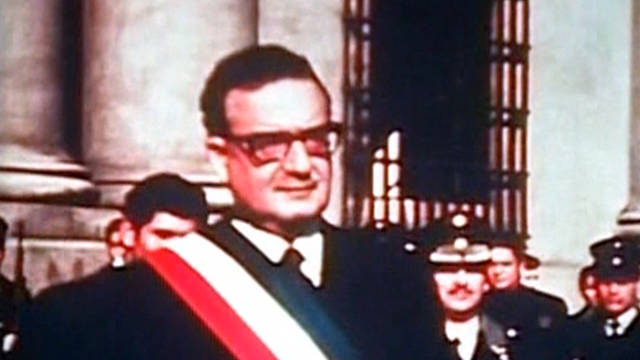
By Amy Goodman & Denis Moynihan
On September 11th, 2001, terror struck the United States. Three thousand people were killed that day, and many more died afterwards, from the pollution at Ground Zero in New York and in the two long wars that followed in Afghanistan and Iraq. At the time, the Democracy Now! news hour broadcast from the garret of an old firehouse in Manhattan’s Chinatown, just blocks from the World Trade Center. On the program that morning, just as the planes struck the two towers, we were discussing the link between terrorism and September 11th – 1973. That was the day that the democratically elected government of Chile was violently overthrown in a U.S.-backed coup d’état.
President Salvador Allende died in La Moneda, the presidential palace, that day, as General Augusto Pinochet rose to power. Allende was elected in 1970, pledging to nationalize critical sectors of the Chilean economy, like copper mining, long controlled by foreign multinational corporations while most Chileans were impoverished. Pinochet’s brutal dictatorship lasted 17 years. Many of Allende’s supporters were arrested, tortured and imprisoned. At least 3,000 were killed or disappeared, and tens of thousands were tortured. The United States government fully supported the coup and the brutal dictatorship that followed.
President Nixon’s National Security Advisor Henry Kissinger said to aides in a meeting on June 27, 1970, several months before the Chilean election, “I don’t see why we need to stand by and watch a country go communist due to the irresponsibility of its own people.” Kissinger predicted, correctly, that Chileans would elect Allende, a democratic socialist. After Allende won, Kissinger and President Richard Nixon funded and fomented discord, destabilization and chaos in Chile. Much of what is publicly known about the U.S. role in the coup comes from declassified documents pried out of the CIA and other agencies by the National Security Archives, based in Washington, DC.
“Literally within 24 hours of the coup, [Kissinger] was in discussion…on how to help the Pinochet regime consolidate,” Peter Kornbluh, head of the Archive’s Chile Documentation Project, said on Democracy Now! “Even as people were being killed and their bodies dumped in the street and rounded up and put into a concentration camp at the stadium and bodies floating in the Mapocho River here in Santiago. Kissinger convened this committee, and we have the declassified memoranda of conversation. The officials there just started joking about the coup.”
For Chileans, the coup was no joke. Ariel Dorfman, 31 years old at the time, was a cultural advisor to President Allende. He was one of the last to see Allende alive.
“I was supposed to be at La Moneda that morning and dawn,” Dorfman recounted on Democracy Now! “I was supposed to have slept the night there, because…you had turns where you’re supposed to receive the news whether there was a coup happening. I switched places with one of my dear friends, who in fact was captured at La Moneda on the 11th. He was tortured and then executed. So, I’m, in a sense, a survivor because of him, or at least so I felt all these years.”
When asked about the U.S. sponsorship of the deadly coup, Dorfman was emphatic: “Kissinger is a war criminal. We all know that.” Dorfman said. “How do you do a counterinsurgency against a people who are armed with the vote, who are armed with their consciousness, who are armed with their desire for liberation and love for one another in solidarity? And so, he understood that he had to destroy Allende, because if Allende’s example would have spread through Latin America, then U.S. interests would have been terribly compromised.”
Pinochet’s mass murder reached beyond Chile’s borders, to the heart of U.S. power. On September 21, 1976, one of Allende’s former ministers, Orlando Letelier, was assassinated in a car bombing in Washington, DC. His assistant, 25-year-old Ronni Moffit, was killed as well.
Despite almost two decades of dictatorship, Chile survived the Pinochet era committed to democracy. While still divided, the Chilean people have sent progressive candidates to office, from former president Michelle Bachelet. She and her mother were tortured under Pinochet; her father, an air force officer, was tortured to death. Chile’s current president is 37-year-old Gabriel Boric. He was a leader of Chile’s student protests over a decade ago, and won a surprise victory over a rightwing opponent last year. President Boric is planning a side trip to Washington, DC, while attending the United Nations General Assembly this month, to visit the scene of Orlando Letelier’s assassination.
Terrorism is a crime, whether committed on September 11th, 2001, or in Chile on September 11th, 1973 and beyond. Henry Kissinger, now 100 years old, should not be hailed as an elder statesman, but should face prosecution for war crimes and crimes against humanity.











Media Options